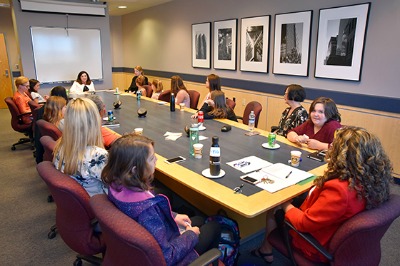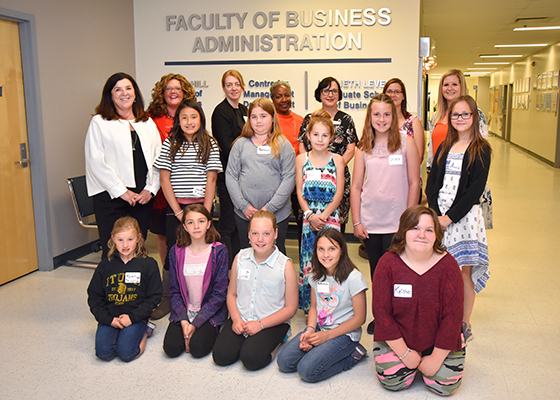Sometimes it’s the simple act of asking a question that can get a girl into trouble.
Ituna, 165 km north of Regina, is home to a small but mighty extra-curricular club for grades 4-6 students who identify as female. Girl Power, the creation of Ituna School principal and University of Regina alumna Brittany Frick, meets several times a year to discuss empowerment and opportunities for girls.
When ten Girl Power members, along with Frick and a parent chaperone, joined five women in University leadership around a boardroom table at the U of R on June 11, the girls came armed with a series of questions and stories of their own.
“I was made fun of when I asked, ‘Do cats run faster than dogs?’” said one of the grade 4 participants. “I just really wanted to know.”
Dr. Gina Grandy, Associate Dean Research and Graduate Studies and Incoming Dean of Business Administration, knows well the power of a question.
“Don’t be afraid to ask questions,” she shared with the girls. “Your belly may turn over, but don’t be afraid to ask even if it doesn’t come out just right. Questioning, and mistakes, are what help us learn.”
Grandy is the RBC Women in Leadership Scholar and the roundtable event was supported by the RBC Women Executive in Residence, the Hill and Levene Schools of Business, and Ituna School.

Rae Staseson, Dean of Media, Art, and Performance, agreed. “Be curious, open, talk about things that matter to you, and ask questions!”
“I encourage each of you to talk to your teacher or someone you know who has gone to university. Ask them their story and what you need to do and how to do it,” shared Dr. Andrea Sterzuk, Acting Dean of Education.
Dr. Judy White, Dean of Social Work, shared that it was only later in life that she has found out about other career opportunities. “As a girl, I never knew that marine biology, for example, existed.” She encouraged the girls to take the time to be curious, travel, and consider every possibility before making their career choices.
Dr. Vianne Timmons, the University’s President and Vice-Chancellor, asked for a show of hands of how many of the girls were surprised that she was the president of a university.
As several hands went up, she asked why.
“Because you’re not a boy,” one student was quick to respond.
Timmons came from a strict East Coast family where, she said, roles were defined by gender early on.
“Our chores, as girls, were to do the dishes and clean the house. And we were told to be ‘nice girls,” she said. “Listen to how many times girls are told to be ‘nice.’ Boys are not.”
Heads nodded in agreement as Staseson stated, “That’s true. Caring, compassion, and empathy tend to be thought of as feminine traits. We are judged for how well we do those things and for how we look and even how we age; our male counterparts do not usually receive the same judgment.”
“I was bullied – they called me fat and lazy,” says a grade six student responding to a question by President Timmons about if the students had experienced bullying.
Unfortunately, many of the girls and women around the table were able to recall times when they had been bullied.
“Ask the why question,” another student offered. “That’s what we’re taught. Ask why the person is bullying you and let someone in authority know what’s going on.”
“Hang around people who lift you up, friends that make you feel good about who you are,” advised President Timmons. “And always look for opportunities and take them as they come your way.”
After the roundtable, Frick shared that, “The importance of a club like Girl Power is about helping students to realize that there are no limitations on their success. That being a girl is in no way a limitation. The roundtable proved that and was a great way for the club to end the year.”
Before heading home, Girl Power members were treated to lunch in the Riddell Centre and a tour of the University with another U of R graduate, Erica Chan, a member of the U of R Recruitment Services team.
Follow us on social media